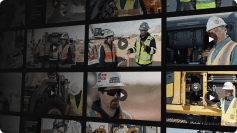How to Create Unity Between the Field and the Office
Written by Jocko Willink
December 30, 2021
In construction, strained relationships between the folks in the field and the folks in the office are common.
There can be an us-versus-them mentality when one team is out getting their hands dirty on the jobsite and the other works in an air-conditioned office. Worse, it can feel like one team's making all the decisions, and the other is just living with them.
As a Dirt World leader, you've seen and felt this friction in your own organization. While it can be easy to shrug off—after all, it's always been there, and your company’s survived—you know it negatively affects your team.
So what’s the solution? Jocko Willink says you have to start by building relationships.
Build relationships
For Jocko, relationships are the core of creating unity.
He explains, "If my boss is telling me to do something that doesn't make sense, I have to have a relationship with my boss so I can actually say, 'Hey boss, can I explain this to you? The way we're doing this right now, I just want to let you know about some secondary tertiary affects that it's gonna have on us."
The boss may not have realized what was about to happen, and they may change the plan. Or they may be okay with those impact and decide to keep rolling with the plan. In that case, they'll do so with a better understanding of the impact it's going to have on the team.
But if there's no relationship between the boss and the worker, then the worker can't bring that information to the boss. And the boss can't ask questions or get feedback from the field to make a better decision.
"The worst thing we can do is not ask questions, not have a relationship, and not communicate with each other," Jocko says.
A Dirt World example
Let’s say, for example, someone on your team realizes the company’s going to lose money on a project. Don't you want that person to come tell you about it?
Maybe you're looking at a long-term relationship with that customer and you're okay with taking a hit on one project, because you've got four more contracts coming up. Now you can tell the team that so they know what's going on.
But maybe you didn't know you were going to lose money. Maybe when the person estimating the project didn't account for moving a certain amount of dirt or shoring up a particular part of the jobsite.
If you've created an environment where people in the field can't tell the office what's going on, you'll never know that. And it'll cost you tens of thousands of dollars.
That's why relationships have to be a two-way street, with people communicating up and down the chain of command.
Tell the people in the field the why
Sometimes, field crews develop a bad attitude toward the office, and there doesn't seem to be a good reason why.
According to Jocko, the field crews aren't the ones to blame. But neither is the office team. If there's a problem, it's on the leader's shoulders.
Jocko explains, “If my team has a bad attitude toward the office, that’s my fault because I’m not explaining to them what’s going on. [I'm not saying] 'Hey everyone, I know this decision just got made that we're going to do X, Y, and Z. Let me explain to you why we're making that decision.'"
Maybe something's going on with the client. Maybe there's a new state regulation that you literally can't get out of. When you tell people these things, they'll stop resenting the office (and you) for issues that are out of your hands. And they may have a good idea of how to fix it.
Jocko adds that you can tell people, “'If anyone's got any suggestions on how to get around, let me know because the boss does want to know. The boss doesn’t want to do this either, but it’s the way the regulation is shaking out. And we either do it or we walk away from this project. I voted we do it, the boss said we'd do it. Let's do it.”
Again, it all comes down to communication. And effective communication means explaining what’s happening, and more importantly, explaining why.
Get in the field
On the flip side of the coin, people in the office can get too detached from the situation in the field. They may even forget they’re working at a construction company, and they lose sight of the fact that there are real people on the field crew doing the work that’s paying for the entire office.
So how do you make sure your office understands what's happening in the field?
“Go get in the field,” Jocko instructs. “When I was a platoon commander, I went on every op. Because I was the platoon commander, so I could. When I was task commander, I couldn’t go on ops. Because I had multiple things I had to do, multiple elements in the field. I had to negotiate with the senior leadership. There were a lot of things going on.”
Being out of the field meant that Jocko wasn't getting to interact with his SEALs as much, and he ran the risk of becoming detached from what was happening. So he took matters into his own hands: "If a time period went by where I hadn’t been in the field in a while, I would go on an op just to go on an op.”
You can do the same thing, and you should. Maybe you can't be out there every week or even every month. Okay, what can you do? Maybe right now you can get out into the field every six weeks. Then that's what you start doing to tune into what's going on out there.
And when you remember what's going on in the field, bring that information back to the rest of the office. Just like you tell the field crews why the office is doing what the office does, tell the office why the field crews are doing what they do.
Tailor your communication style to each team
Managing people in the field often requires a different communication style than managing your office. So varying your communication style is a key component to relieve tension between the two teams.
And it’s not just the difference between field and office. You can use this strategy for dealing with individuals or smaller groups within the organization.
As Jocko puts it, “Not all blue-collar people are the same. And not all white-collar people are the same. Depending on who I’m talking to, I’m going to communicate with them in a way that makes the most sense to them. So do I vary my communication? Yeah, absolutely.”
Knowing when and how to vary your communication depends on building relationships with the people in the field and the office so you know who you're talking to and how you can get them to respond best.
Takeaways
Creating unity between your team in the field and your team in the office is possible. These four tips from Jocko will help you do that:
- Build relationships so you can communicate up and down the chain of command. Leaders should talk to the people who report to them, and those people should feel confident approaching the leader with issues, too.
- Tell the people in the field why. When people in the field know why people in the office handed down a certain decision, that creates understanding and stops resentment from spreading on the team.
- Get in the field. If you feel you’ve lost touch with how things are done onsite, it’s time to roll up your sleeves and get back out there so you know what's going on.
- Tailor your communication style to each team (and individual). Get to know your people, and then think about who you're talking to. How can you say this in a way that makes the most sense to them?
Remember, improving relationships takes time. But follow this advice and you'll be well on your way to a more unified workforce.
← Are Millennials the Problem?
How Mental Health Affects Your Team →














